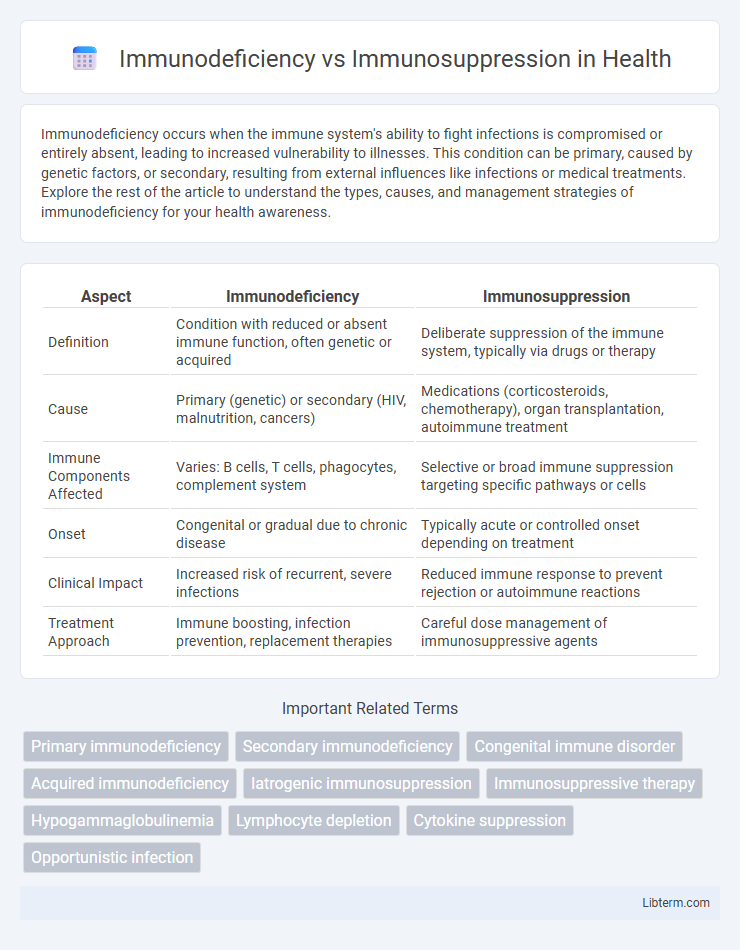Immunodeficiency occurs when the immune system's ability to fight infections is compromised or entirely absent, leading to increased vulnerability to illnesses. This condition can be primary, caused by genetic factors, or secondary, resulting from external influences like infections or medical treatments. Explore the rest of the article to understand the types, causes, and management strategies of immunodeficiency for your health awareness.
Table of Comparison
| Aspect | Immunodeficiency | Immunosuppression |
|---|---|---|
| Definition | Condition with reduced or absent immune function, often genetic or acquired | Deliberate suppression of the immune system, typically via drugs or therapy |
| Cause | Primary (genetic) or secondary (HIV, malnutrition, cancers) | Medications (corticosteroids, chemotherapy), organ transplantation, autoimmune treatment |
| Immune Components Affected | Varies: B cells, T cells, phagocytes, complement system | Selective or broad immune suppression targeting specific pathways or cells |
| Onset | Congenital or gradual due to chronic disease | Typically acute or controlled onset depending on treatment |
| Clinical Impact | Increased risk of recurrent, severe infections | Reduced immune response to prevent rejection or autoimmune reactions |
| Treatment Approach | Immune boosting, infection prevention, replacement therapies | Careful dose management of immunosuppressive agents |
Introduction to Immunodeficiency and Immunosuppression
Immunodeficiency refers to the state where the immune system's ability to fight infectious diseases is compromised or entirely absent, often due to genetic defects or acquired conditions such as HIV/AIDS. Immunosuppression involves the deliberate reduction of immune system activity, commonly induced by medications like corticosteroids or chemotherapy to prevent organ transplant rejection or treat autoimmune diseases. Understanding the distinction is crucial for accurate diagnosis and targeted treatment in immunological disorders.
Definition of Immunodeficiency
Immunodeficiency is a condition characterized by the impaired functioning or absence of one or more components of the immune system, leading to increased susceptibility to infections and disease. This disorder can be congenital, as seen in primary immunodeficiencies like Severe Combined Immunodeficiency (SCID), or acquired, such as in HIV/AIDS patients. Immunodeficiency differs from immunosuppression, which refers to the deliberate reduction of immune activity through medication or medical treatment.
Definition of Immunosuppression
Immunosuppression refers to the deliberate reduction or inhibition of the immune system's activity, often induced by medications such as corticosteroids, calcineurin inhibitors, or chemotherapy agents to prevent organ transplant rejection or treat autoimmune diseases. Unlike immunodeficiency, which is a congenital or acquired disorder impairing immune function, immunosuppression is an intentional, controlled medical intervention. This suppression decreases the body's ability to fight infections and malignancies, necessitating careful monitoring for opportunistic infections.
Key Differences Between Immunodeficiency and Immunosuppression
Immunodeficiency refers to the inherent or acquired failure of the immune system to function properly, leading to increased susceptibility to infections, often caused by genetic conditions or diseases like HIV/AIDS. Immunosuppression involves the deliberate reduction or inhibition of immune responses, typically induced by medications or treatments such as corticosteroids and chemotherapy, to prevent organ transplant rejection or manage autoimmune diseases. The key difference lies in immunodeficiency being a compromised immune state due to internal dysfunction, while immunosuppression is an externally induced, controlled reduction of immune activity.
Causes of Immunodeficiency Disorders
Immunodeficiency disorders arise from genetic defects such as primary immunodeficiencies like Severe Combined Immunodeficiency (SCID) or from acquired causes including HIV infection, malnutrition, and chemotherapy. These conditions impair the immune system's ability to produce effective antibody or cellular responses, leading to increased susceptibility to infections. Unlike immunosuppression, which is often medically induced to prevent transplant rejection or treat autoimmune diseases, immunodeficiency primarily results from intrinsic immune system failures or external insults compromising immune function.
Causes of Immunosuppression
Immunosuppression results from several causes, including pharmacological agents like corticosteroids, chemotherapy drugs, and immunosuppressive therapies used in organ transplantation to prevent rejection. Viral infections such as HIV directly impair immune function, leading to acquired immunosuppression. Additionally, diseases like leukemia or lymphoma and malnutrition contribute to weakened immune responses by disrupting normal immune cell production and function.
Common Symptoms and Clinical Manifestations
Immunodeficiency presents with recurrent infections, chronic diarrhea, and failure to thrive, reflecting an impaired immune response due to genetic or acquired factors. Immunosuppression, often induced by medications or diseases, leads to opportunistic infections, delayed wound healing, and increased susceptibility to malignancies. Both conditions share symptoms like frequent infections and fatigue but differ in underlying causes and progression of immune dysfunction.
Diagnosis and Laboratory Evaluation
Diagnosis of immunodeficiency involves identifying genetic or acquired defects in immune system components through tests such as lymphocyte subset analysis, immunoglobulin quantification, and complement assays. Immunosuppression diagnosis requires evaluation of immune function suppression often caused by medications, infections, or diseases, using laboratory tests including T-cell function assays, cytokine profiling, and monitoring immunosuppressive drug levels. Comprehensive laboratory evaluation in both conditions aids in distinguishing primary immune defects from secondary immune suppression to guide targeted treatment strategies.
Treatment Strategies and Management
Treatment strategies for immunodeficiency primarily involve immunoglobulin replacement therapy, targeted antimicrobial prophylaxis, and hematopoietic stem cell transplantation to restore or enhance immune function. Immunosuppression management focuses on balancing the reduction of immune activity through corticosteroids, calcineurin inhibitors, or biologics while minimizing the risk of infections and adverse effects. Personalized treatment plans and regular monitoring of immune parameters are critical in optimizing outcomes for patients with either immunodeficiency or immunosuppression.
Prevention and Patient Care Considerations
Immunodeficiency, characterized by an inherent or acquired failure of immune functions, requires proactive infection prevention through vaccinations, antimicrobial prophylaxis, and patient education on hygiene practices. Immunosuppression, often induced by medications such as corticosteroids or chemotherapy, mandates careful monitoring for opportunistic infections and tailored immunization schedules to minimize risk. Both conditions necessitate individualized patient care plans emphasizing early detection of infections, routine immune status assessments, and multidisciplinary coordination for optimizing treatment outcomes.
Immunodeficiency Infographic

 libterm.com
libterm.com